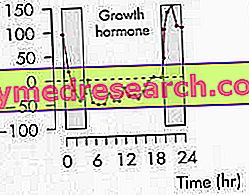Related articles: Colica
Definition
"Colica" comes from the Greek kólon, a term that suggests an intestinal origin. It is, in fact, of
a violent spasmodic contraction of the smooth muscles of viscera and hollow organs (biliary tract, intestine or urinary tract).
The causes of a colic can be represented by stimuli of an obstructive or mechanical nature (eg calculations that block and irritate the tissues) or inflammatory (in the presence of infections). Even the cold, stress, anxiety, excessive nutrition, food intolerances, meteorism and aerophagia can trigger this syndrome.
Colic manifests itself in the form of acute spastic pain, with sudden onset, sometimes intermittent and preceded by general malaise, nausea and vomiting. Pain tends to be associated with short periods of remission and usually regresses spontaneously once the trigger is resolved. Colic does not therefore need special treatments. Often, rest is enough to reduce pain; at other times the doctor may prescribe antibiotics (if the bacterial nature of an infection is ascertained), painkillers (NSAIDs) and antispasmodics.
Colic can have different locations of origin, depending on the organ from which it springs.
In abdominal colic, the painful crisis is due to hypertonicity or distension of smooth muscle in the intestine. Usually, it occurs in the periombelical area and can be associated with repeated and abundant vomiting. Abdominal colic can be caused by food intolerances, colitis, gastroenteritis, toxinfections, ulcerative colitis, obstruction and impaired bowel motility, Crohn's disease, irritable bowel syndrome and binge eating disorder.
Renal colic is a violent lumbar painful crisis, with irradiation to the hypochondrium and thighs, sometimes associated with paralytic ileus, vomiting and urinary disorders with the emission of turbid or haematic urine. Usually, it is a consequence of the migration of a calculation.
Hepatic colic, on the other hand, is an abdominal pain syndrome that occurs in the right hypochondrium for distension and contraction of the gallbladder and biliary tract. Violent pains related to the hepatic region usually appear after a meal rich in fat and alcohol or arise from an excess of stress. Hepatic colic often occurs during the night and persists for a few hours. Sometimes, it is associated with biliary vomiting.
In gaseous colic, pain is attributable to fermentative-type phenomena that dilate the bowel loops. Usually, it appears in newborns and resolves spontaneously within the sixth month of life. During the painful crisis, the child begins to fidget with clenched fists, cries intensely and desperately, keeps his legs flexed on his abdomen and repeats sucking movements, as if he were hungry.
Rapid medical evaluation is necessary if colic is associated with fever, abdominal wall rigidity and suspected appendicular pathology, intestinal obstruction or cardiovascular collapse.
Possible Causes * of Colica
- Anxiety
- Appendicitis
- Liver Calculations
- Gall bladder stones
- Kidney stones
- cystinuria
- Cistopielite
- cholecystitis
- Colitis
- Ulcerative colitis
- Hemorrhagic corpus luteum
- Uncontrolled feeding disorder
- Abdominal hernia
- Inguinal hernia
- Gastroenteritis
- Viral gastroenteritis
- hydronephrosis
- Lactose intolerance
- Food intolerance
- melioidosis
- Crohn's disease
- Bowel obstruction
- Peritonitis
- Irritable bowel syndrome
- Adjoining twist
- Testicular torsion



